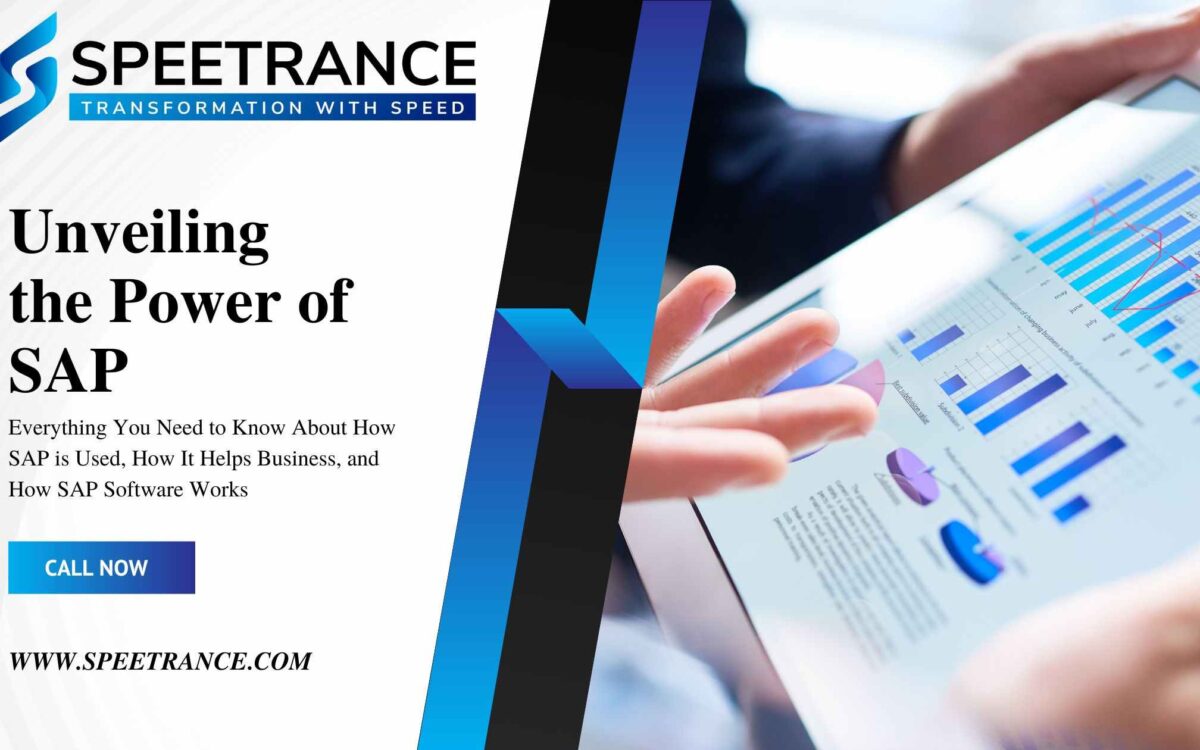
Unveiling the Power of SAP: Everything You Need to Know About How SAP is Used, How It Helps Business, and How SAP Software Works
In today’s rapidly changing business environment, competition means more than hard work. It requires intelligent operations, streamlined processes, and data-driven decision-making. SAP is a robust platform at the core of many successful businesses. What is SAP exactly? How does SAP work, what is its purpose, and what benefits does it bring businesses?
This comprehensive guide is designed to help you understand SAP. It will better understand its capabilities, impact on various industries, and the fundamental mechanisms driving its functionality. You’ve come to a great place if you are a business executive looking to learn more about new technologies, an IT professional who wants to expand their knowledge, or just curious to know what drives many of the largest companies in the world. If, after reading the article, you realize the potential for SAP to transform your company, Speetrance is ready to help.
What is SAP exactly?
At its core, SAP (Systems, Applications & Products in Data Processing) is a leader in enterprise software. SAP, originally known as an Enterprise Resource Planning system (ERP), has evolved into a suite of interconnected apps designed to manage and integrate every aspect of a company. Imagine it as the central nervous system of an organization. It connects various departments and business processes on a single platform.
SAP is much more than just data management. SAP provides real-time insight, automates processes, increases efficiency, and helps businesses grow and profit.
How SAP is used for
SAP’s versatility is a key strength. The phrase SAP is used For to describe various industries and business functions. We’ll explore a few key areas where SAP’s power can be leveraged.
- Enterprise Resource Planning (ERP), a cornerstone of SAP’s offerings, remains the core of its offerings. SAP ERP systems integrate business processes like finance, human resources, manufacturing, supply chains, services, and procurement. SAP ERP centralizes data and workflows to provide a single source of truth. This eliminates data silos and improves collaboration. A manufacturing firm can use SAP ERP to manage all aspects of its business, from the procurement of raw materials to production scheduling to final product distribution.
- Customer Relationship Management: SAP CRM helps businesses manage interactions with their current and prospective customers. Sales automation, marketing campaigns and customer service functionality are all included. This allows organizations to improve customer relationships and increase sales. Imagine a team of salespeople using SAP CRM for tracking leads, managing opportunities, and accessing a complete history on customer interactions. This would lead to a more personalized and practical engagement.
- SAP SCM Solutions optimizes the flow and information of goods and finances from suppliers, manufacturers, retailers, and consumers. Demand planning, inventory management, and logistics are included. SAP SCM, for example, can be used by a global retailer to forecast demand fluctuations, optimize inventory levels in different warehouses, and ensure timely deliveries of products.
- Human Capital Management: SAP HCM, now often part of SAP SuccessFactors, helps organizations manage their most important asset: employees. It includes payroll, benefit administration, talent (recruiting and performance management), learning, and workforce planning. A large company can use SAP HCM to streamline payroll for thousands of employees in different countries. Its talent management tools are also helpful in identifying and developing the next generation of leaders.
- Business Intelligence and Analytics (BI and Analyses): SAP offers powerful tools to analyze business data, generate reports, and gain actionable insights. It allows decision-makers to understand performance and identify trends. Imagine a team of marketers using SAP BI to analyze the results of recent campaigns to determine which channels were most successful and where future resources should be allocated.
- SAP’s adaptability and tailor-made solutions are demonstrated in specific industries beyond these core areas.
SAP Retail: SAP is Retail
SAP is Retail highlights SAP’s presence in the retail industry and its specialized solutions. SAP’s dynamic solutions help businesses in this sector manage everything from inventory, merchandising, and customer engagement to omnichannel experiences.
- Inventory Management: SAP Retail Solutions provides real-time visibility of inventory levels across channels. This prevents stockouts and excessive overstocking, which are critical to maintaining retail profitability. Imagine that a clothing retailer uses SAP to track sales across online and brick and mortar stores. This will automatically trigger replenishment orders if stock levels drop below a threshold.
- SAP is a powerful tool for managing merchandise, including planning and purchasing, as well as pricing and promotions. SAP allows retailers to plan assortments and negotiate with vendors. It also helps them set strategic prices, execute promotional campaigns, and manage promotions.
- Omnichannel Commerce – Today’s customers expect seamless shopping across all channels. SAP allows retailers to integrate online and offline operations. This provides a consistent brand and allows customers to interact seamlessly.
- SAP Customer Engagement: By leveraging CRM functionality within the retail context SAP helps retailers better understand their customers, personalize offers and build loyalty. This could include analyzing the purchase history of customers to send targeted promotions or recommend relevant products.
- The statement “SAP retail” does not mean SAP is only focused on the retail industry. It emphasizes SAP’s depth and breadth regarding solutions tailored to meet the challenges and opportunities unique to this industry.
How SAP software works and how SAP works: Unpacking the functionalities
To truly grasp the power of SAP, we must understand “how SAP software functions” and how SAP operates on a fundamental basis. Although the architecture is complex, its core principles are integration, data management, and process automation.
- SAP software is usually designed in a modular way. Businesses can select and implement modules that meet their needs. A small manufacturing firm, for example, might initially implement the modules of finance and production planning, then add CRM and SCM later as it grows. The modularity of the system allows for flexibility and scalability.
- Centralized database: The heart of the majority of SAP deployments is a central database. All applications in the SAP landscape have access to the same data. The information from a sales order, for instance, is instantly available to inventory management and finance. It eliminates redundant data and allows for real-time communication across the entire organization.
- SAP’s Process-Oriented architecture is designed to optimize and support end-to-end processes. SAP does not focus on one department but facilitates information flow and activity across various functional areas. SAP modules can manage the order-to cash process seamlessly, including everything from collecting a customer’s order to collecting payment.
- Configuration and Customization Options: SAP offers a standard framework but also extensive customization and configuration options. It allows companies to customize the system according to their needs without having to write extensive custom code. Speetrance consultants are crucial in understanding clients’ needs and configuring SAP to meet them.
How SAP application connects to database: The crucial connection
SAP’s efficiency and ability to respond in real-time heavily depend on the connection between SAP applications and databases. This connection is vital for applications to store, retrieve, and manipulate the massive amounts of data flowing through the system.
SAP applications typically communicate with the database using well-defined interfaces. Using SQL (Structured Query Language) or proprietary methods optimized for performance is common. This architecture ensures data integrity, security, and quick access times, even for large volumes of data.
Modern SAP systems are high-speed at processing data, especially those that use SAP S/4HANA . This allows real-time reporting and analytics on transactional data.
SAP’s tangible benefits:
SAP’s value is ultimately determined by “how SAP assists business” in achieving its goals. Benefits are many-sided and can significantly impact an organization’s performance and bottom line.
- SAP increases efficiency by automating repetitive tasks and streamlining workflows. This allows businesses to operate more efficiently and reduce errors. Employees can then focus on strategic activities.
- SAP enables businesses to make better decisions faster by leveraging real-time data.
- SAP promotes collaboration and communication across the company by integrating departments and processes. This helps to break down silos and encourages a unified strategy.
- SAP CRM Functionalities: Improved Customer Relationships: SAP CRM functionalities enable businesses to understand their customers better, personalize their interactions, and create stronger, more profitable relations.
- SAP SCM Solutions Optimized supply chains: SCM solutions help companies optimize their supply chain, reduce costs, improve the delivery time, and better respond to market changes.
- SAP Systems are designed for growth and to accommodate changing needs and business growth. This ensures a technology base that is stable and future-proof.
Imagine a multinational company that implemented SAP S/4HANA. IDC reported that companies running SAP S/4HANA saw an average 11% increase in revenues, 8% in operating costs, and 19% in inventory costs. (Source: IDC White Paper “The Business Benefits of Running SAP S/4HANA, 2023”). These numbers show the impact SAP has on essential business metrics.
Real-world experience and expertise
Speetrance, having worked with many organizations in various industries, has seen first-hand the transformative powers of SAP. We’ve seen first-hand how an SAP system implemented correctly can streamline complex manufacturing and retail supply chain processes. It also empowers service-oriented companies to provide exceptional customer experiences.
We partnered with one mid-sized manufacturer that was struggling with legacy systems. We helped them integrate production planning, financial accounting, and inventory management by implementing SAP S/4HANA. The result was a 20% decrease in lead times and a 15% reduction in inventory holding costs. They also had a significantly improved level of visibility throughout their operation.
Speetrance’s team comprises SAP experts with extensive knowledge of various SAP modules. Our team at Speetrance understands that a successful SAP installation goes beyond installing software. It requires a thorough knowledge of the client’s processes and strategic goals and a tailored configuration and deployment approach.
Building Trust: Our Commitment to Your Success
Choosing the right technology partner for any major software implementation is essential. We are proud of our vendor-neutrality, our understanding of SAP’s ecosystem, and the unwavering dedication to our clients. We build long-term relationships with our clients, and guide them through each step of their SAP journey.
Transparency, clear communication, and a collaborative attitude are our core values. We want to equip your business with all the knowledge and tools needed to maximize the potential of SAP.
Conclusion: Harnessing the power of SAP
SAP is much more than software. It’s a powerful, flexible platform that delivers significant value to businesses of all sizes in diverse industries. SAP’s comprehensive solution suite includes ERP, CRM, and SCM to streamline core business operations. Understanding SAP, how SAP can help businesses, and how SAP works is the first step to unlocking its transformational potential.
Speetrance can help you if you want to learn more about how SAP software can revolutionize your business. Our SAP experts provide comprehensive SAP services, from the initial consultation and implementation through to ongoing support and optimizing. Contact us now to start your journey toward a more intelligent, efficient and successful future powered with SAP.
Speetrance will help you discover the true power of SAP.
Read Also :





